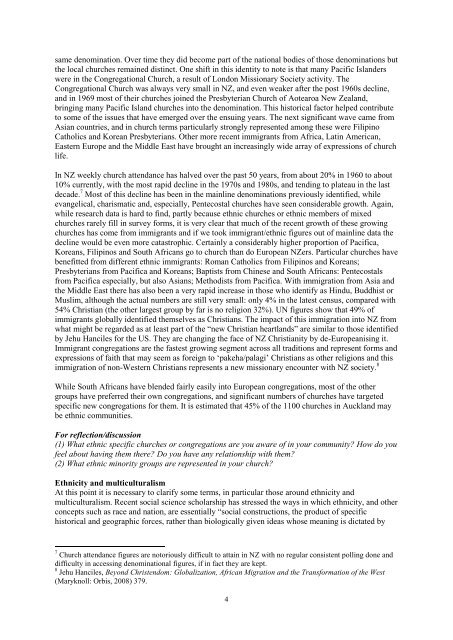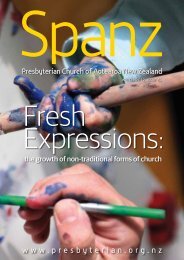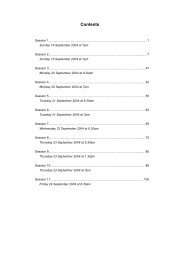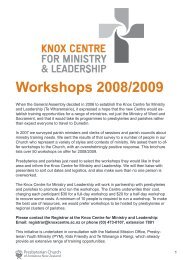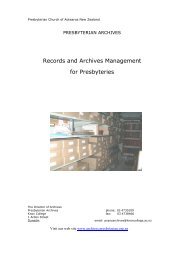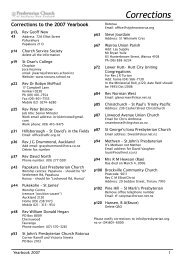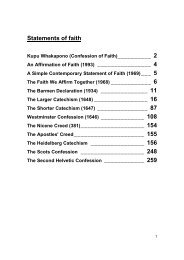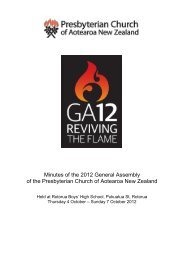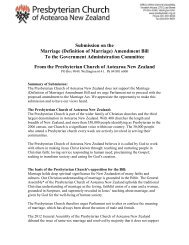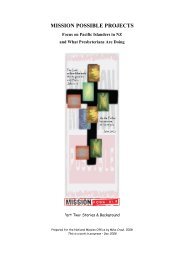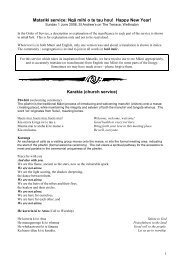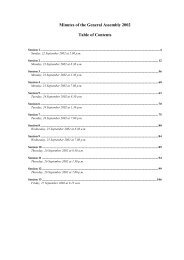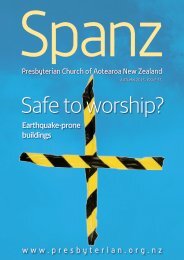Cultural diversity and unity in Christ: the Presbyterian Church of ...
Cultural diversity and unity in Christ: the Presbyterian Church of ...
Cultural diversity and unity in Christ: the Presbyterian Church of ...
You also want an ePaper? Increase the reach of your titles
YUMPU automatically turns print PDFs into web optimized ePapers that Google loves.
same denom<strong>in</strong>ation. Over time <strong>the</strong>y did become part <strong>of</strong> <strong>the</strong> national bodies <strong>of</strong> those denom<strong>in</strong>ations but<br />
<strong>the</strong> local churches rema<strong>in</strong>ed dist<strong>in</strong>ct. One shift <strong>in</strong> this identity to note is that many Pacific Isl<strong>and</strong>ers<br />
were <strong>in</strong> <strong>the</strong> Congregational <strong>Church</strong>, a result <strong>of</strong> London Missionary Society activity. The<br />
Congregational <strong>Church</strong> was always very small <strong>in</strong> NZ, <strong>and</strong> even weaker after <strong>the</strong> post 1960s decl<strong>in</strong>e,<br />
<strong>and</strong> <strong>in</strong> 1969 most <strong>of</strong> <strong>the</strong>ir churches jo<strong>in</strong>ed <strong>the</strong> <strong>Presbyterian</strong> <strong>Church</strong> <strong>of</strong> Aotearoa New Zeal<strong>and</strong>,<br />
br<strong>in</strong>g<strong>in</strong>g many Pacific Isl<strong>and</strong> churches <strong>in</strong>to <strong>the</strong> denom<strong>in</strong>ation. This historical factor helped contribute<br />
to some <strong>of</strong> <strong>the</strong> issues that have emerged over <strong>the</strong> ensu<strong>in</strong>g years. The next significant wave came from<br />
Asian countries, <strong>and</strong> <strong>in</strong> church terms particularly strongly represented among <strong>the</strong>se were Filip<strong>in</strong>o<br />
Catholics <strong>and</strong> Korean <strong>Presbyterian</strong>s. O<strong>the</strong>r more recent immigrants from Africa, Lat<strong>in</strong> American,<br />
Eastern Europe <strong>and</strong> <strong>the</strong> Middle East have brought an <strong>in</strong>creas<strong>in</strong>gly wide array <strong>of</strong> expressions <strong>of</strong> church<br />
life.<br />
In NZ weekly church attendance has halved over <strong>the</strong> past 50 years, from about 20% <strong>in</strong> 1960 to about<br />
10% currently, with <strong>the</strong> most rapid decl<strong>in</strong>e <strong>in</strong> <strong>the</strong> 1970s <strong>and</strong> 1980s, <strong>and</strong> tend<strong>in</strong>g to plateau <strong>in</strong> <strong>the</strong> last<br />
decade. 7 Most <strong>of</strong> this decl<strong>in</strong>e has been <strong>in</strong> <strong>the</strong> ma<strong>in</strong>l<strong>in</strong>e denom<strong>in</strong>ations previously identified, while<br />
evangelical, charismatic <strong>and</strong>, especially, Pentecostal churches have seen considerable growth. Aga<strong>in</strong>,<br />
while research data is hard to f<strong>in</strong>d, partly because ethnic churches or ethnic members <strong>of</strong> mixed<br />
churches rarely fill <strong>in</strong> survey forms, it is very clear that much <strong>of</strong> <strong>the</strong> recent growth <strong>of</strong> <strong>the</strong>se grow<strong>in</strong>g<br />
churches has come from immigrants <strong>and</strong> if we took immigrant/ethnic figures out <strong>of</strong> ma<strong>in</strong>l<strong>in</strong>e data <strong>the</strong><br />
decl<strong>in</strong>e would be even more catastrophic. Certa<strong>in</strong>ly a considerably higher proportion <strong>of</strong> Pacifica,<br />
Koreans, Filip<strong>in</strong>os <strong>and</strong> South Africans go to church than do European NZers. Particular churches have<br />
benefitted from different ethnic immigrants: Roman Catholics from Filip<strong>in</strong>os <strong>and</strong> Koreans;<br />
<strong>Presbyterian</strong>s from Pacifica <strong>and</strong> Koreans; Baptists from Ch<strong>in</strong>ese <strong>and</strong> South Africans: Pentecostals<br />
from Pacifica especially, but also Asians; Methodists from Pacifica. With immigration from Asia <strong>and</strong><br />
<strong>the</strong> Middle East <strong>the</strong>re has also been a very rapid <strong>in</strong>crease <strong>in</strong> those who identify as H<strong>in</strong>du, Buddhist or<br />
Muslim, although <strong>the</strong> actual numbers are still very small: only 4% <strong>in</strong> <strong>the</strong> latest census, compared with<br />
54% <strong>Christ</strong>ian (<strong>the</strong> o<strong>the</strong>r largest group by far is no religion 32%). UN figures show that 49% <strong>of</strong><br />
immigrants globally identified <strong>the</strong>mselves as <strong>Christ</strong>ians. The impact <strong>of</strong> this immigration <strong>in</strong>to NZ from<br />
what might be regarded as at least part <strong>of</strong> <strong>the</strong> “new <strong>Christ</strong>ian heartl<strong>and</strong>s” are similar to those identified<br />
by Jehu Hanciles for <strong>the</strong> US. They are chang<strong>in</strong>g <strong>the</strong> face <strong>of</strong> NZ <strong>Christ</strong>ianity by de-Europeanis<strong>in</strong>g it.<br />
Immigrant congregations are <strong>the</strong> fastest grow<strong>in</strong>g segment across all traditions <strong>and</strong> represent forms <strong>and</strong><br />
expressions <strong>of</strong> faith that may seem as foreign to ‘pakeha/palagi’ <strong>Christ</strong>ians as o<strong>the</strong>r religions <strong>and</strong> this<br />
immigration <strong>of</strong> non-Western <strong>Christ</strong>ians represents a new missionary encounter with NZ society. 8<br />
While South Africans have blended fairly easily <strong>in</strong>to European congregations, most <strong>of</strong> <strong>the</strong> o<strong>the</strong>r<br />
groups have preferred <strong>the</strong>ir own congregations, <strong>and</strong> significant numbers <strong>of</strong> churches have targeted<br />
specific new congregations for <strong>the</strong>m. It is estimated that 45% <strong>of</strong> <strong>the</strong> 1100 churches <strong>in</strong> Auckl<strong>and</strong> may<br />
be ethnic communities.<br />
For reflection/discussion<br />
(1) What ethnic specific churches or congregations are you aware <strong>of</strong> <strong>in</strong> your comm<strong>unity</strong>? How do you<br />
feel about hav<strong>in</strong>g <strong>the</strong>m <strong>the</strong>re? Do you have any relationship with <strong>the</strong>m?<br />
(2) What ethnic m<strong>in</strong>ority groups are represented <strong>in</strong> your church?<br />
Ethnicity <strong>and</strong> multiculturalism<br />
At this po<strong>in</strong>t it is necessary to clarify some terms, <strong>in</strong> particular those around ethnicity <strong>and</strong><br />
multiculturalism. Recent social science scholarship has stressed <strong>the</strong> ways <strong>in</strong> which ethnicity, <strong>and</strong> o<strong>the</strong>r<br />
concepts such as race <strong>and</strong> nation, are essentially “social constructions, <strong>the</strong> product <strong>of</strong> specific<br />
historical <strong>and</strong> geographic forces, ra<strong>the</strong>r than biologically given ideas whose mean<strong>in</strong>g is dictated by<br />
7 <strong>Church</strong> attendance figures are notoriously difficult to atta<strong>in</strong> <strong>in</strong> NZ with no regular consistent poll<strong>in</strong>g done <strong>and</strong><br />
difficulty <strong>in</strong> access<strong>in</strong>g denom<strong>in</strong>ational figures, if <strong>in</strong> fact <strong>the</strong>y are kept.<br />
8 Jehu Hanciles, Beyond <strong>Christ</strong>endom: Globalization, African Migration <strong>and</strong> <strong>the</strong> Transformation <strong>of</strong> <strong>the</strong> West<br />
(Maryknoll: Orbis, 2008) 379.<br />
4


